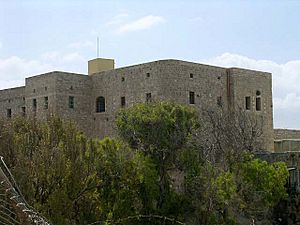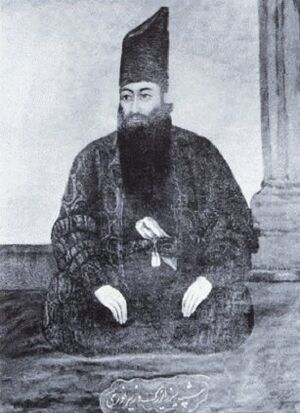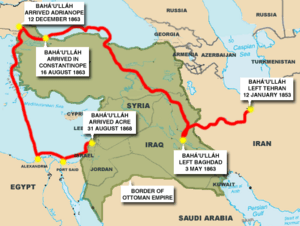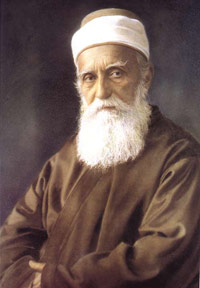Bahá'u'lláh facts for kids
Baháʼu'lláh, whose name means "Glory of God", was a nobleman from Persia. He founded the Bahá'í Faith, a religion that teaches about peace and unity.
He was born in the city of Tehran, in Persia, in 1817. His followers believe he was a messenger from God, sent to guide humanity.
Contents
Who Was Baháʼu'lláh?
Baháʼu'lláh's birth name was Mírzá Ḥusayn-ʻAlí Núrí. He came from a wealthy and respected family in Persia. Even as a young boy, he was known for his wisdom and kindness. He did not go to school in the usual way, but people were amazed by his deep understanding of many things.
His Early Life and Family
Baháʼu'lláh's father, Mírzá Buzurg, was a government minister. Baháʼu'lláh chose not to follow a political career. Instead, he spent his time helping others and thinking about spiritual matters. He was known for being very generous and caring for the poor.
The Báb's Influence
In the mid-1800s, a new religious movement began in Persia, started by a young man called the Báb. The Báb taught that a new messenger from God would soon appear. Baháʼu'lláh heard about the Báb's teachings and became one of his followers. This was a brave decision because the Báb's followers faced much danger and persecution.
Baháʼu'lláh's Message
Baháʼu'lláh taught that there is only one God and that all religions come from this one God. He believed that humanity is one big family and that everyone should work together for peace.
Key Teachings for a Better World
Some of Baháʼu'lláh's main teachings include:
- The equality of men and women.
- The importance of education for everyone.
- The need for harmony between science and religion.
- Getting rid of all kinds of prejudice, like racism.
- Working towards a world where all nations live in peace.
He wrote many books and letters, called "Tablets," explaining his teachings. These writings form the holy scriptures of the Baháʼí Faith.
Life of Exile and Imprisonment
Because of his beliefs and his growing number of followers, Baháʼu'lláh faced many difficulties. The government and religious leaders in Persia saw him as a threat.
Forced Journeys and Hardships
Baháʼu'lláh was exiled, meaning he was forced to leave his home country. He was sent on long, difficult journeys to different cities.
- First, he was sent from Tehran to Baghdad (in modern-day Iraq).
- Then, he was moved to Istanbul (Constantinople) and Adrianople (in modern-day Turkey).
- Finally, he was sent to the prison city of ‘Akká (in modern-day Israel).
He spent many years in prison and under house arrest. Even though he was a prisoner, he continued to write and share his message of peace and unity.

His Final Years
Baháʼu'lláh lived in ‘Akká for 24 years. He passed away peacefully in 1892 near ‘Akká. His resting place is a holy site for Baháʼís around the world.
The Baháʼí Faith Today
After Baháʼu'lláh's passing, his eldest son, ʻAbdu'l-Bahá, led the Baháʼí community. He helped spread his father's teachings around the world. Today, the Baháʼí Faith is a global religion with millions of followers in almost every country.
Baháʼís believe that Baháʼu'lláh's teachings offer solutions to many of the world's problems. They work to build a peaceful and just society based on his principles.
Images for kids
-
The house where Baháʼu'lláh stayed in Adrianople
See also
 In Spanish: Baha'ullah para niños
In Spanish: Baha'ullah para niños
 | Georgia Louise Harris Brown |
 | Julian Abele |
 | Norma Merrick Sklarek |
 | William Sidney Pittman |










